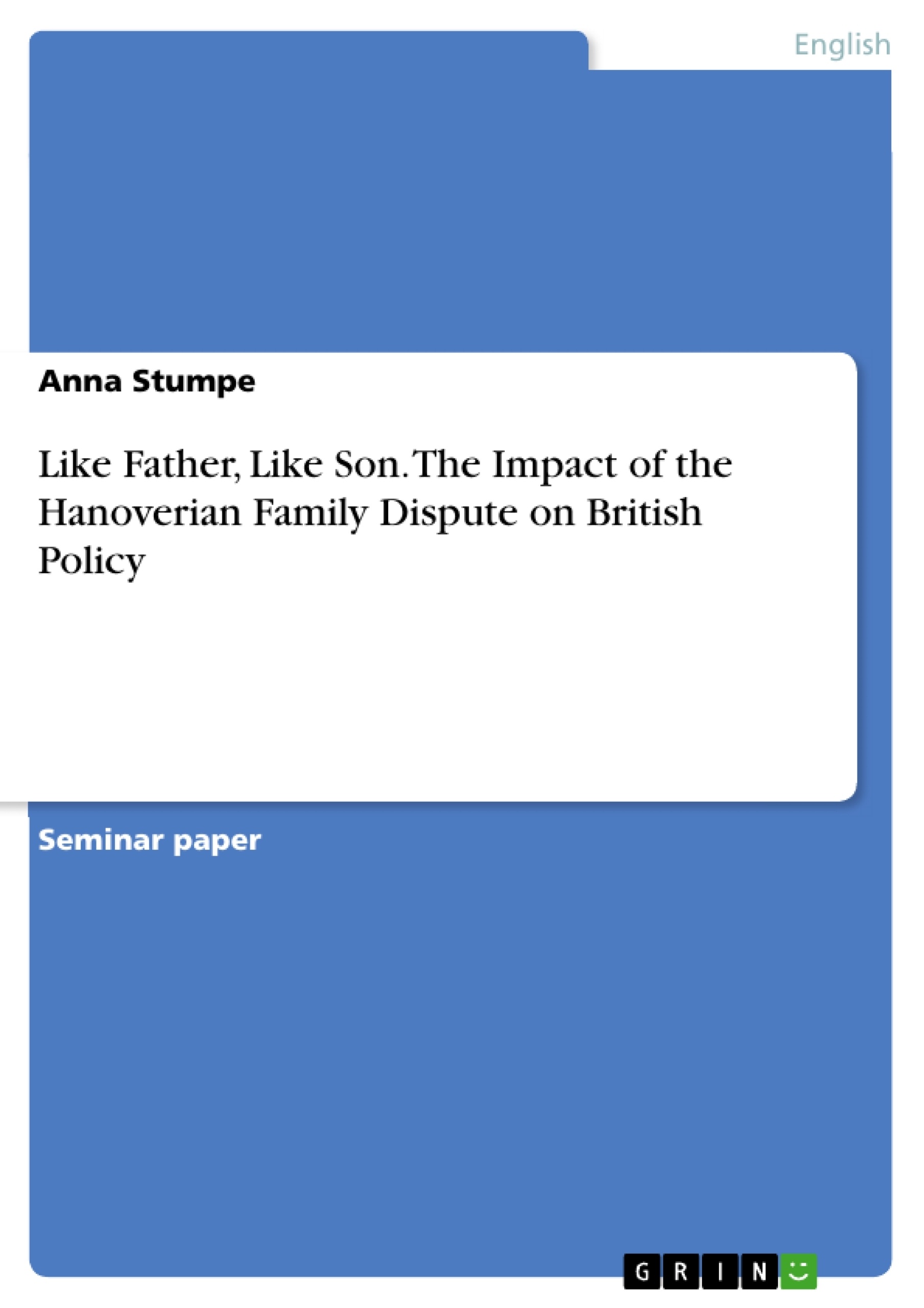This assignment questions the family dispute within the early Hanoverian court, more precisely those between George Louis, Prince of Brunswick-Luneburg and his son George August, Prince of Wales and how far their relationship influenced governmental and administrative procedures in British domestic and foreign policy in both the reigns of George I (1714- 1727) and George II (1727-1760).
Within the scope of the history of British monarchy, there is a considerable, growing specialist literature on British foreign policy and therefore an increasing interest on the Hanoverian Electorate. Most of the works concentrate on biographical data of George I and George II and historical effects of their political procedures, such as the Glorious Revolution or the Jacobite Rebellions. However, the core theme of this assignment lies in the relationship between both the kings, with relevance to the British monarchy’s history and to what extent the Hanoverians have a bearing on imminent British policy.
By contrast, with contemporaries, there is less information on both George I and George II. The amount of information, research and publications continues to fall on the second half of the eighteenth century. In the account of the eighteenth century as a whole, works on the first half do not play a main role but in recent decades an interest in George II looms what calls for the reference to his father, George I, as well.
Inhaltsverzeichnis (Table of Contents)
- Introduction
- The Hanoverian Family Dispute
- The Impact on British Politics of the Family Dispute
- Court Life
- Domestic Policies
- Foreign Policies
- Conclusion
Zielsetzung und Themenschwerpunkte (Objectives and Key Themes)
This research explores the strained relationship between George I and George II, the first two Hanoverian kings, and how their family dispute influenced British domestic and foreign policies during the early eighteenth century, encompassing the reigns of both monarchs.
- The nature and origins of the Hanoverian family dispute
- The impact of the dispute on court life
- The influence of the dispute on domestic policies
- The effect of the dispute on British foreign policy
- The lasting consequences of the family dispute for the British monarchy
Zusammenfassung der Kapitel (Chapter Summaries)
1. Introduction
This chapter introduces the research topic, focusing on the family dispute between George I and George II and its impact on British policy during the early Hanoverian era. It provides an overview of existing scholarship on British monarchy and the Hanoverians, highlighting the focus on biographical data and the impact of political events.
2. The Hanoverian Family Dispute
This chapter delves into the history of the strained relationship between George I and George II, exploring its origins and development. The chapter examines key events and factors contributing to the tension between father and son, including the adultery of George II's mother, Sophia Dorothea, and the influence of Ernest August, George I's father. The chapter also highlights the impact of primogeniture and the public clash surrounding George II's son's baptism.
3. The Impact on British Politics of the Family Dispute
This chapter analyzes the impact of the family dispute on various aspects of British politics, including court life, domestic policies, and foreign policies.
3.1 Court Life
This section examines the impact of the dispute on court life, focusing on the strained relationship between the king and his heir and its effect on royal ceremonies and social interactions.
3.2 Domestic Policies
This section explores the influence of the family dispute on domestic policies, considering how the tension between the king and his son affected political decision-making and the dynamics within Parliament.
3.3 Foreign Policies
This section investigates the impact of the dispute on British foreign policy, examining how the relationship between the king and his heir influenced diplomatic relations with other European powers.
Schlüsselwörter (Keywords)
This research examines the Hanoverian family dispute, British monarchy, early eighteenth century, George I, George II, court life, domestic policy, foreign policy, primogeniture, Jacobite rebellions, Glorious Revolution, dynastic politics.
Frequently Asked Questions
What caused the dispute between George I and George II?
The dispute was rooted in family tensions, including the adultery of Sophia Dorothea (George II's mother) and public clashes over royal ceremonies, such as a grandson's baptism.
How did the family feud affect British domestic policy?
The tension between the King and the Prince of Wales often created rival political circles and influenced parliamentary dynamics and decision-making.
Did the dispute impact British foreign policy?
Yes, the strained relationship between the monarch and his heir influenced diplomatic relations with other European powers and the management of the Hanoverian Electorate.
What is the significance of the Hanoverian era in British history?
It marked the beginning of the constitutional monarchy after the Glorious Revolution and saw significant events like the Jacobite Rebellions.
Why is there less research on George I and II compared to later kings?
Historically, more focus has been placed on the second half of the 18th century, though interest in the early Hanoverians has grown in recent decades.
- Arbeit zitieren
- B.A. Anna Stumpe (Autor:in), 2010, Like Father, Like Son. The Impact of the Hanoverian Family Dispute on British Policy, München, GRIN Verlag, https://www.grin.com/document/306267



